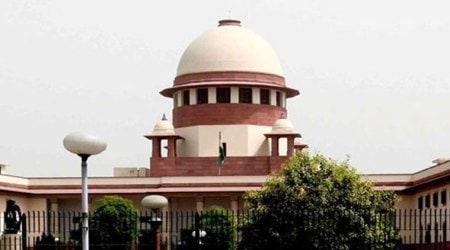 He contended that “personal liberty” in Article 21 is a “liberty which is circumscribed — it relates only to the person of the individual and is smaller conceptually than civil liberty”
He contended that “personal liberty” in Article 21 is a “liberty which is circumscribed — it relates only to the person of the individual and is smaller conceptually than civil liberty”
REPRESENTATIONS OF the Centre and various states before the nine-judge bench of the Supreme Court on the Right to Privacy case indicate that while most BJP-led governments opposed the inclusion of privacy as a fundamental right, the non-BJP governments supported the petitioners’ demand.
Kapil Sibal, senior counsel and Congress leader who appeared on behalf of the states of Karnataka, West Bengal, Punjab and Puducherry “broadly supported the petitioners”. He contended in court that decisions of the eight-judge bench in the M P Sharma case in 1954 and the six-judge bench in the Kharak Singh case of 1962 have “ceased to be relevant in the context of the vastly changed circumstances”. He also offered a yardstick to evaluate the existence of the right when a “state action…violates the fundamental right to privacy”.
Any such state action “must contain at least four elements,” he said. “The action must be sanctioned by law,” it “must be necessary in a democratic society for a legitimate aim”, the “extent of such interference must be proportionate to the need for such interference”, and “there must be procedural guarantees against abuse of such interference”.
P V Surendra Nath, appearing on behalf of the state of Kerala, supported the petitioners and stated that the “constitutional right to privacy very much exists in Part III of the Constitution”. Aryama Sundaram, appearing for Maharashtra, argued that “there is no separate “privacy” right, and that “privacy is a vague and inchoate expression”. He also “referred to the Constituent Assembly debates to buttress the same proposition that the right to privacy was expressly discountenanced by framers of the Constitution”.
He contended that “personal liberty” in Article 21 is a “liberty which is circumscribed — it relates only to the person of the individual and is smaller conceptually than civil liberty”. A Sengupta, appearing on behalf of Haryana, stated that “even the US Supreme Court no longer uses the right to privacy to test laws that were earlier tested on this ground”.
He said, “Any right to privacy is conceptually unsound, and only comprehensive data protection legislation can effectively address concerns of data protection and privacy.” Rakesh Dwivedi, arguing on behalf of Gujarat, contended that only those privacy claims which involve a “reasonable expectation of privacy” be recognised as protected by the fundamental right. However, he also argued that both the petitioners and Attorney General K K Venugopal have taken “extreme positions”. While “petitioners state that in the case of every invasion of a privacy right, howsoever trivial, the fundamental right to privacy gets attracted, according to the Attorney General, there is no fundamental right to privacy at all”.
He urged the court to “adopt an intermediate position”, and noted that if a petitioner satisfies the test of “reasonable expectation of privacy”, then “such infraction of privacy can be elevated to the level of a fundamental right”.
Dwivedi also noted that while “individual personal choices made by an individual are already protected” under Article 21, “when individuals disclose certain personal information in order to avail a benefit”, then it can be said that they have “no reasonable expectation of privacy, as they have voluntarily and freely parted with such information”.

